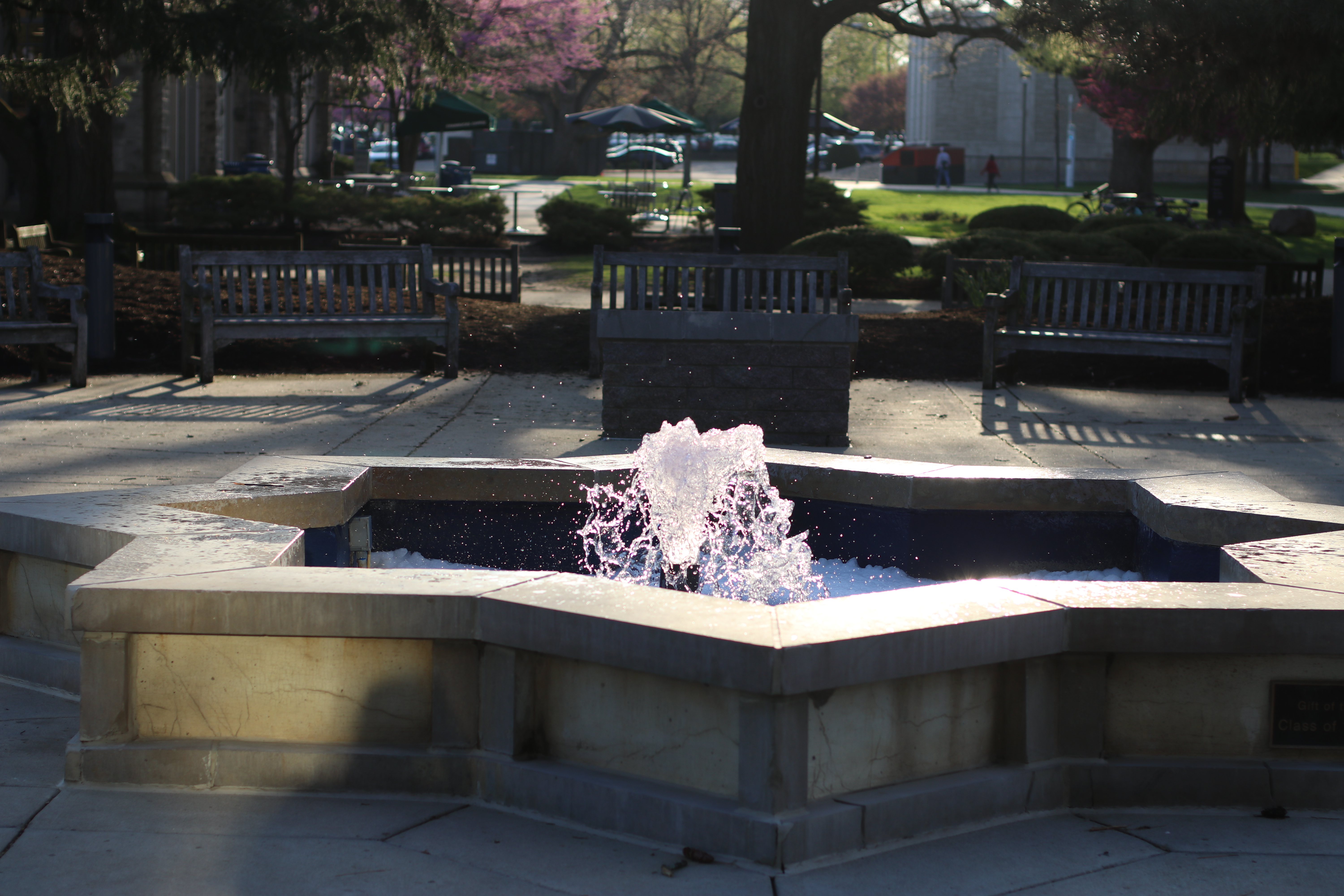Advocates for Autism faces challenges with dyeing Star Fountain red. Photo by Grace Hensley.
TYLER ELLIS | STAFF REPORTER | teellis@butler.edu
During Autism Acceptance Month, Butler’s Advocates for Autism, A4A, dyed Star Fountain red in recognition of the Red Instead movement. The fountain was dyed just a few hours after it was filled for the spring on April 10, turning the water a dark red which appeared in Butler promotional videos. The fountain was planned to be kept red for a week.
Sarah Blade, a senior biology and classics double major and the vice president of A4A, had her hopes up for the newly dyed fountain after working to get the dye approved. However, the dye did not go according to plan.
“It’s not a crazy amount of money, but we did pay to get the fountain dyed, and we were all excited,” Blade said. “I didn’t have time to go see it up close, but I’d seen it from a distance and I was going to go back and take pictures … but somebody soaped the fountain overnight.”
Students pouring soap into Star Fountain is not a new occurrence, especially when students first move onto campus for the fall or when the fountain is refilled in the spring. This leads to a fountain full of bubbles that take to the wind and scatter across the Atherton lawn. Within a day, however, Star Fountain was drained and cleared of the bubbles and the dye that A4A had paid for.
“I heard that Butler facilities had to drain and refill it … which is disappointing because we did pay, and we were excited,” Blade said. “We put in this request forever ago, so I’m not sure that facilities could even redo it.”
Although soap in the fountain is not unusual, members of A4A were frustrated that their dye job was short-lived.
Madelin Snider, a senior art and design major, said that although the soap was likely not intentionally ableist, the timing of the prank was insensitive.
“It’s just weird to me that the night we dyed the fountain red, [people] decided to soap it,” Snider said. “They could have done it any other time or waited a week, but they decided, ‘Oh, I’m gonna do this now.’ Even if it wasn’t meant to be an attack on the celebration of this month and autistic students, it really came across that way because of the timing of it all.”
Much like Latinx Student Union’s orange dye for Hispanic Heritage Month last September, students across campus were unsure about the fountain’s new color. Although Autism Acceptance Month is a celebration of autistic joy and a movement against ableism, online backlash left a sour taste in students’ mouths.
Snider said that she expected some degree of backlash, especially on YikYak, a platform known for hosting anonymous hate speech on campus. However, the comments were still hurtful.
“People were saying, ‘Oh, the fountain is on its period,’ or things like that,” Snider said. “Someone replied to [a post] saying we wanted a cure [for autism]. People are bringing eugenics talk into it and saying, ‘Just get rid of autistic people.’”
The stigma around autism and autistic students in higher education leaves many students fearful and excluded, said Snider — but this feeling is not exclusive to Butler.
“It’s not a new feeling — I was treated like I was weird my entire life,” Snider said. “Seeing how confident people are in putting statements like that out there, even if it is anonymous, is just kind of baffling. It’s hard to describe that feeling of knowing that even one person on your campus doesn’t care or would even be happy if you did not exist.”
Sav Shultz, a junior speech, language and hearing sciences major and the president of A4A, said although organizations like Autism Speaks view autism as a disorder in need of a cure, groups led by autistic people such as A4A advocate otherwise.
“I know that the Autistic community as a whole does not want a cure — what we really need is just a more accepting society,” Shultz said. “We need a society that automatically, without question, accommodates people as they are, instead of expecting everyone to conform into a mold.”
Shultz said that a common criticism of Autism Acceptance Month is that it is unnecessary, flashy or “loud.”
“I feel like a lot of people think that Autism Acceptance Month isn’t needed, which I think is wrong,” Shultz said. “It is absolutely needed and necessary because autistic people are still treated as outcasts or burdens on society.”
Shultz expressed frustration with her inability to be publicly proud of her identity as an autistic person, even during Autism Acceptance Month.
“Why should we have to hide who we are?” Shultz asked. “If neurotypical or non-autistic people can proudly be themselves, why can’t we find joy and pride in our identity as autistic people? For whatever reason, whenever autistic people do that, people get uncomfortable or even scared.”
A4A aims to educate students and create a safe environment to ask questions in both their meetings and programming such as the “Ask an Autistic” and special interest showcase events. Despite the struggle to keep Star Fountain red, A4A stays committed to their cause and will continue to educate the Butler community through April and beyond.



